Robert Meldrum
(1851-1941)
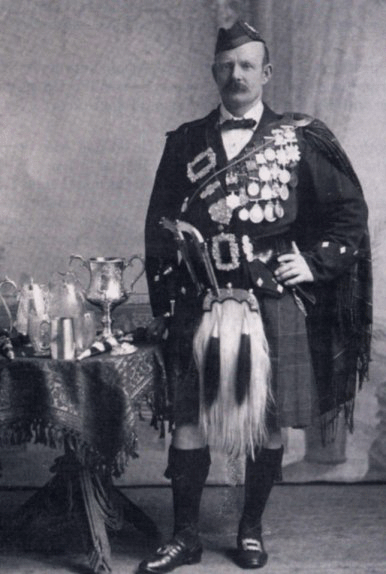
He is most frequently seen in later photos as a jolly old man with a bushy, gray moustache, but in his day, Robert Meldrum was a formidable performer, an influential mind, and a much loved piping figure.
He was born in Tomintoul, Banffshire on May 13, 1851, and in 1868, at the age of 16, he enlisted in the 78th Highlanders (Ross-shire Buffs). He was transferred to Halifax, Nova Scotia the following year. He was taught by a succession of great pipers: Malcolm MacPherson (Calum Piobaire), Pipe Major Willie Murray and Pipe Major Ronald MacKenzie of the 78th, nephew of John Ban MacKenzie. MacKenzie was his pipe major in Canada.
He served with the 78th until 1873, when he purchased his discharge, then he joined up again three months later. In 1875, he was appointed Pipe Major of the 93rd Highlanders, becoming, at the time, the youngest pipe major in the British army. He had been recommended for the post by Uilleam Ross, piper to Queen Victoria, who held Meldrum in such high esteem that he hoped for him to be his successor as Queen’s piper.
From 1887, he was Pipe Major of the 3rd Cameron Highlanders until he retired in 1892. From that time until the outbreak of the Great War, he served as piper to the Earl of Ancaster at Drummond Castle. He would rejoin the Camerons in 1914. During the war years he formed a pipe band with the 3rd Special Reserve Battalion at Invergordon, consisting of wounded soldiers returning from the trenches. He was discharged in 1917 at age 65, and later became piping instructor at Queen Victoria School in Dunblane, teaching the sons of Scottish soldiers. He eventually retired to Inverness where he became pipe major of the Royal British Legion Pipe Band.
Stringent military life restricted his opportunities to compete, and he certainly would have achieved more fame as a competitor had he been able to travel regularly to the games. But his success was still impressive. He won the Prize Pipe at Inverness in 1884 (an ivory set made by Uilleam Ross). He won the Gold Medal at both Oban and Inverness in 1886, and the Clasp at Inverness in 1902. As the years went on, he became renown for maintaining a high standard of performance at an advanced age. He continued to compete until near the end of his life, and was second in the Clasp when he was in his 80s. Captain John MacLellan once said that Robert Meldrum was the best piper he had ever heard, though by the time MacLellan was old enough to knowledgeably hearing Meldrum play, the man would have been in his mid-80s. One might wonder if what Capt. MacLellan meant was, “If this guy is this good now….”
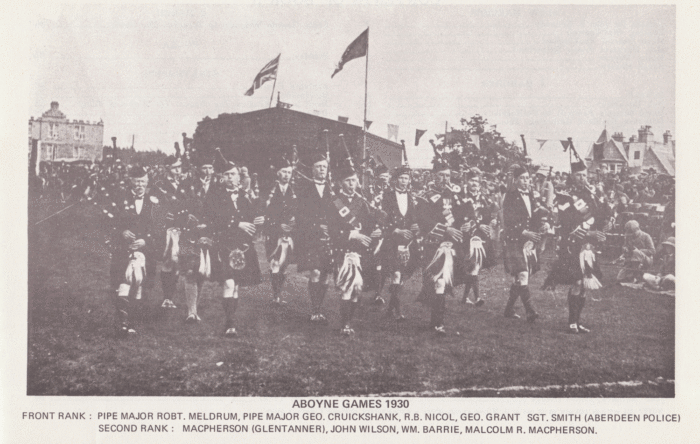
John Wilson wrote of him in his autobiography, A Professional Piper in Peace and War, published in 1978.
In 1930, Pipe Major Robert Meldrum, then 83 years of age, led the march of the pipers round the arena [at Aboyne Highland Games]. There is a photograph of this in my Book 1 of Highland Bagpipe Music. Piper Major Meldrum competed in the Open Piobaireachd event that day and played “Mary’s Praise for Her Gift.” He was a wonderful old man and a fine player and very successful in his day.
Three of Meldrum’s pupils – John MacKay, William Robb, and A. D. Longair – were Gold Medallists. His sons William and Ronald also became pipers.
He was a prolific composer, though only a few of his tunes are still played today. The Logan collection, published in the first decade of the 1900s, contains quite of few of his compositions, including some jaunty two-parted ‘polkas’ that deserve a revival.
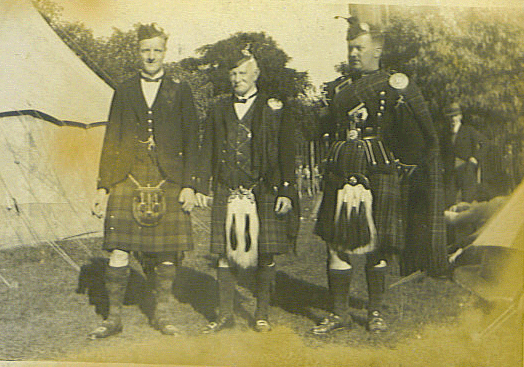
Though prize lists attest to his strength as a light-music player, his forte was in piobaireachd. He was a life-long student, copying manuscripts by hand and keeping up with all the controversies of the day. It was Meldrum who brought two important piobaireachds to light – “Lament for Captain MacDougall” and “I Am Proud to Play a Pipe” – which he found in the manuscripts of John Ban MacKenzie, transcribed them and sent them to John MacDougall Gillies.
He lived out his last years in Inverness, where he died on July 16, 1941 at 90. He is buried in Springbank Cemetery in Aberdeen.
A modest man, “Robbie” probably had no idea that one of his more significant legacies would grow out of an interview he gave to a very persistent Malcolm MacInnes in 1940. The “Reminiscences of Pipe Major Robert Meldrum” would be published in the Oban Times that year, and excerpts published in the Piping Times in 1951 and 1996. They provide an intriguing glimpse back to the time when the great marches had yet to be written, Peter Henderson had not yet made a bagpipe, and the founders of the Piobaireachd Society were still children. Some excerpts:
On Ronald Mackenzie, an influential piper of the late 1800s, whose playing standard has more than once come under scrutiny:
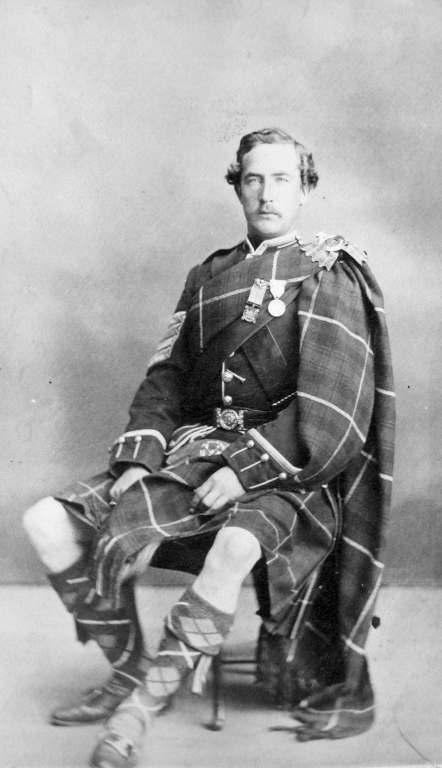
I began [piobaireachd] under Ronald MacKenzie in Canada with the Seaforths. Though he had the name of being the finest piper in the world, he was far from being that.
On the Cameron family:
I first heard the leading pipers in 1870 when I was with the 93rd in Aberdeen and went to the Aboyne Games. The best player was Donald MacPhee, Glasgow. He was good at pibroch as well as the light music. Alick Cameron, the son of Donald Cameron, was there, but he was not competing. He was piper to the Marquis of Huntly, and played him to the gathering with “Cock of the North.” He played the tune splendidly and in a style which I had never heard before but was able to pick up and still remember. I never heard him again playing a tune, though I often heard him testing chanters in Henderson’s, Glasgow, when he was employed about the Lord Provost’s offices. He was subsequently employed by Locheil. He died and was buried in Inverness. He did not compete at games, and neither did his brother Colin, piper to the Duke of Fife. But the brother, Keith, who was for a short period Pipe Major of the H.L.I., took some part in competitions. He, too, had a great name. He was about the same age as myself. In 1874 we were both at the Tomintoul Games. I got the first prize and he got nothing, but he did not do himself justice. He was then piper to Macpherson Grant of Ballindalloch. The Camerons belonged to Maryburgh, in Easter Ross. Donald had been piper to Seaforth and had probably been taught by John Bain Mackenzie. His brother Sandy was equally famous.
On the Queen’s Piper post, and on being a pipe major:
I may disclose that I paid some visits to Ross at Osborne House, in the Isle of Wight, and he often said he was to recommend me for his post on his retirement. But he died suddenly in 1891. It seems he had been interested in me for many years, though he did not know me personally. He first heard me playing at Braemar in 1873, as piper to the Guard of Honour at Ballater. Next year he heard me with the 78th at Aldershot, where he had come to get me made Pipe-Major of the 93rd. I told him that I was happier as I was, and that he did not seem to be a soldier and could not dispose of such a post. I had never met him before and did not know who he was. Captain Forbes of the 78th, on hearing of this, was angry, and said to me: “You are a d… fellow. You will never be Pipe-Major of the 78th, for Ronald mackenzie has still ten years to go.” I replied that I was happier as a piper than as a Pipe-Major, and I did not want to be Pipe-Major of anything. But things were arranged and I had to go to the 93rd. I had fifteen happy years with them as Pipe-Major.
On competing (once again he is “a d… fellow”):
As regards playing in competitions, I was never in a position to attend many of the games. When I was stationed in Maryhill with the 93rd, I used to compete on a Saturday when I could get a pass. But the Colonel (Macpherson of Cluny), getting tired of signing my passes, sent for me and said: “You d… fellow! What do you mean by this hawking all over the country?” and I replied: “Sir, I am trying to win a few shillings for myself and credit for the regiment. I think I can hold my own among the pipers.” His answer was: “When you want to go away, report yourself to the Sergeant Major, and when you come back, tell the Sergeant of the Guard.” But when I got transferred to the Cameron Militia, I did not bother going outside Inverness and Ross. I was never a regular competitor like the best of my opponents.
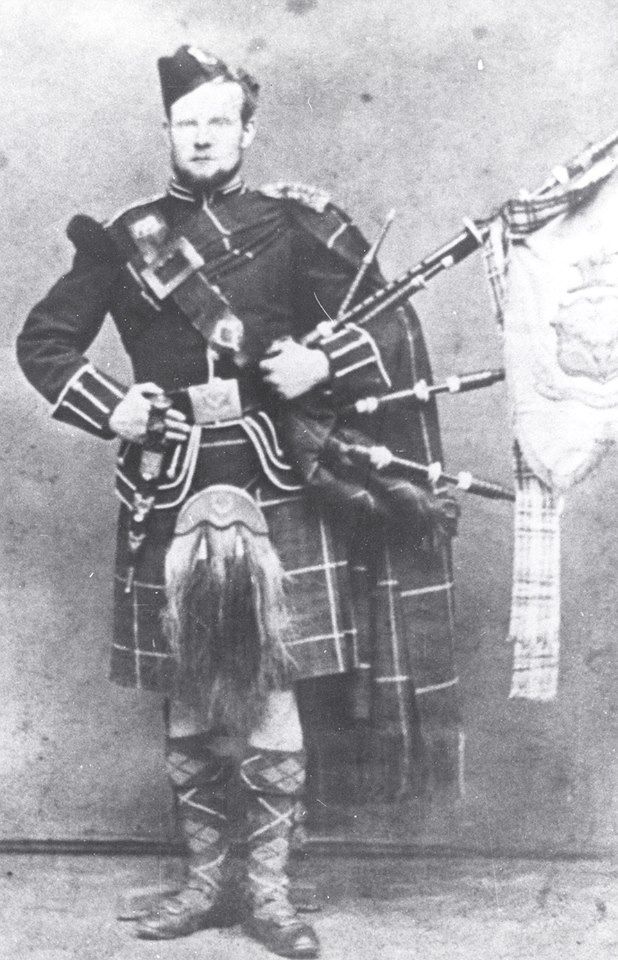
On the great pipers of his day:
The most famous of my earlier opponents were Malcolm Macpherson, Cluny [Calum Piobaire]; Angus and George Macdonald, Morar; Angus MacRae, Raasay; William MacLennan, Edinburgh; Pipe Major John Connon of the Royal Scots; John MacColl, Oban; William Sutherland, Airdrie; Macdougall Gillies, Glasgow; and John and Angus Macpherson, sons of Malcolm, and some of the best pipers of today came out before I stopped competing altogether. At pibroch playing, Malcolm Macpherson was the father of us all. It may not be too much to say that for musical expression and taste he was the best ever heard by me. Of course, as regards fingering and production, there have been many just as good. Alick and Colin Cameron did not compete in my time. The leading pipers just before my time were Donald Cameron and his brother, Sandy, Duncan Campbell, Foss, Peter Maclaren, Lochearnhead; Angus Macpherson, Cluny (father of Malcolm, a native of Skye); Sandy Macdonald, Glentruin (father of John Macdonald, Inverness) and his brother William, piper to the Prince of Wales and composer of “Tullich MacCarrrick,” now called “Leaving Glenurquhart,” and Alexander MacLennan, Inverness, composer of the pibroch, “The Barisdale Salute.”
On piping life in the past:
The life of the old pipers, whether army, family or private, used to embrace a good deal of happiness and fun of various kinds. Perhaps they did not take things so seriously as they do today. It is told, for instance, that on the night before the Northern Meeting in Inverness, Malcolm Macpherson and Sandy Macdonald, Glentruin, got so engrossed in their own jollification that they forgot they had to play at the first night’s ball and did not arrive till the first reel had been danced. Their masters were so angry that they took them down to the station and sent them home, waiting to see the train had started. But the pipers got out at Forres and returned to the Northern Meeting to enjoy themselves in the crowd and laugh at the woes of their friends trying to tune their pipes and whispering and grumbling in secret about the incompetent judges.
On his band and the experiences of army piping:
An Army piper is likely to have interesting experiences. One day, when we were stationed at Gibraltar, I had my band playing on the Almeda. Our audience consisted of one person, but he seemed to be very interested in the playing. At the interval he came over to me and said, “You have a splendid band.” I replied that I was glad he was pleased with it, and we got into conversation. After a while, he astonished me by saying: “Do you know my piper?” I replied, “I do not. Have you a piper?” “Yes, I have a piper.” “Well, if he is a piper of any note, I may know him, or have heard of him.” “Duncan Macdougall is my piper.” I immediately stood to attention and saluted and said: “Then, Sir, you will be the Marquis of Breadalbane.” “Yes,” he replied, and then complimented me again on the band, saying that it was the best that he had heard though he had heard the bands in Scotland. It appeared that he had come to Gibraltar on a yachting tour.
On changes in piobaireachd playing:
I sometimes feel strongly inclined to describe the development and progress of piping during my time, but I am restrained by the difficulty of the task as well as by the risk of giving offense. It is known to everyone that in the development of the lighter music the advance in fingering has been immense, the old tunes being improved and new tunes being composed more complicated though sometimes not more musical. In pibroch playing also there is a change, though it is not easy to describe it. The playing of the variations, with their clearly marked rhythm, is practically the same as of old, but the playing of the ground is not. A certain lack of quiet smoothness seems to me to be general even among good pipers, at least of a certain school. Ross and Malcolm Macpherson never had a snatch or jerk in the ground. For instance, the introductory E in such tunes as “Mary MacLeod” and “The Only Son” could never have been mistaken for a theme note, nor the first A shortened into a grace note, or the phrase made the rattle that is common today. It was timed like the parallel phrase on the B. The encroachment of this introductory E is by some leading players allowed in “Glengarry’s March” so far as to swamp the low G into a grace and then the low A into a grace, so that the point of the tune is lost.
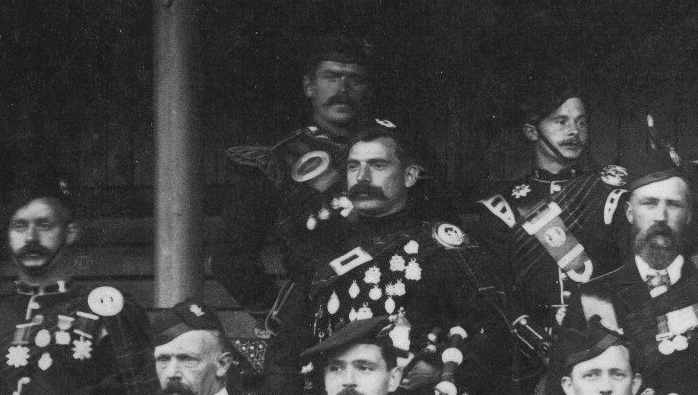
On MacDougall Gillies
Another that will live in the history of piping is John Macdougall Gillies, of Glasgow. He belonged to Aberdeen, where he was a painter. John was in the band of the Aberdeen Volunteers under Pipe-Major Fettes, composer of the “Glendaruel Highlanders,” who went to South Africa. We were about the same age. I was getting taught at the barracks by Willie Murray, Pipe Major of the depot, and I used to pass on my knowledge to John. He had a brother, Alick, who was a better player. John was afterwards taught by Alick Cameron, Donald Cameron’s son, who was with the Marquis of Huntly at Aboyne Castle. He was for about two years piper to Breadalbane, and then went to Glasgow in the railway service. When Peter Henderson, the pipe-maker, died, Gillies was made manager of the business and remained there until his death. He had much of the tradition of the Camerons, studied pibroch most assiduously and did a great deal of teaching.
On other great pipers:
Another good piper who won distinction in another sphere was Charlie Dunbar, Pipe Major of the 92nd Gordons. He was promoted lieutenant and got the D.C.M. at Elandslaagte in South Africa. When he finished his army service he went to Hamilton, in Canada. He died about year ago.
Another fine player of pibroch and a pupil of Malcolm Macpherson’s, is Pipe-Major William MacLean, of the 5th (Lochiel’s) Camerons. He is connected with Benbecula and Raasay. He was Pipe Major of the 3-4 Camerons till they were broken up.
Pipe-Major John Connon was in the front rank of pipers. He was for some time with Dixon of Poolewe. Then he joined the Royal Scots and became pipe major. He composed some tunes, one of the best being the march, “The Ross-shire Volunteers.”
One does not hear much now-a-days of William MacKinnon, but the composer of the march, “The 74th’s Farewell to Edinburgh,” deserves to be remembered. He was pipe major of the 74th Highlanders (now the Highland Light Infantry). He won the Medal at Inverness in 1866. He was quarter-master sergeant, got his commission and rose to the rank of major. He played the pibroch at the officers’ mess during the regiment’s stay in Aldershot in 1881-82, when I was there with the 93rd, where I was a competitor and he was a judge. In the marches he gave me the 74th to play, and I was awarded the first prize. He complimented me on my rendering of it and told me he was the composer.
Another of the first-class pipers within my acquaintance was George Allan. He was at the very top in pibrochs and marches, but he did not do the round of all the games. He belonged to Peterhead. He was pipe major of the Scottish Horse. He afterwards enlisted in the Royal Scots, and put in his twenty-one years’ service. Though he did not take things seriously enough, he could play a most impressive pibroch. I remember his rendering of “The King’s Hand” at Crieff, when he got first and Willie Ross of the Scots Guards got second with the same tune. Angus Macrae and myself were the judges.
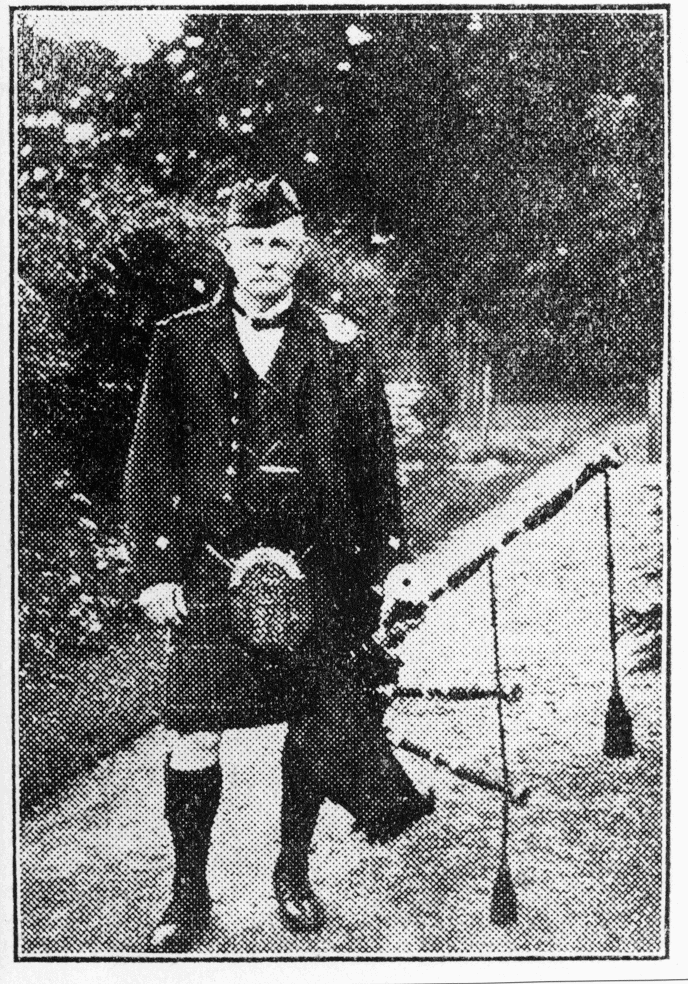
On a prize-money controversy:
I had gone to this gathering [the Glasgow Exhibition Games of 1887] knowing nothing of an unfortunate though perhaps amusing difference between the pipers and the management. On my arrival, Willie MacLennan met me and asked me what the devil I was doing there. I replied that I was not afraid of any of them, and I asked why I should not be there. He explained that they had protested against the smallness of the prizes and that they were not going to play. Eventually Angus Macrae and Gillies played, though they had protested, but MacColl and MacLennan did not. They got into some trouble for “booing” some of those who played. Gillies got the pibroch and I was second. The judges praised my playing but for me reed. Someone had removed my own reed and substituted another. In the previous year I had won the pibroch at Oban and at Inverness, and I was satisfied.
On the importance of listening, and the technical revolution led by the MacLennans:
As to the learning of pipe music, the formal and first teaching in the case of the great players may really count for less than what is picked up by hearing others and what is built on this foundation by the players themselves. Very few players play exactly like their teachers. Though I think John MacColl got some lessons from Donald MacPhee and Ronald Mackenzie, it is almost certain he learnt much from the playing of others like the Camerons, Malcolm Macpherson and perhaps Gillies. I don’t know who taught Willie MacLennan, but I think he got his general style also from the same final sources. He was a fine player of both pibroch and the light music. I sometimes thought he overloaded with grace notes, but he had a good finger, which is necessary to prevent gracing from being messing.
JM, October 2010
-with notes from ‘Pipers of the Highland Regiments, 1854-1902’, by R. H. Crawford, published by Savannah; ‘Piping Times’, 1996; ‘The Cabar Feidh Collection, Pipe Music of the Queen’s Own Highlanders’ (Seaforth and Camerons); ‘Piping Traditions of Argyll’, by Bridget MacKenzie; ‘Piping and Dancing’ magazine, May, 1940; ‘Notices of Pipers’ from Piping Times, Oct. 1973; ‘The Highland Pipe and Scottish Society: 1750-1950’, and conversations and research from Janette Montague and Dr. William Donaldson.

25 Comments
This is a most inspiring story about my great grandfather!!!!
My family moved to Canada from Hamilton Scotland in 1953 when I was 6 yrs old and it’s just been the last few years since I’d even seen those pictures of my great grandfather. My parents and brother and sister have all passed but my son and I have started to take an interest in our family history.kind of late but never now than never.
Hi Elaine – this is about my GGF, too. My mother Irene’s maiden name was Meldrum, b. Aberdeen 1911.
This is my GGF too, My father was Robert Forbes Meldrum, and his father was the son of the pipe major, they lived in Kilmacolm where I was born, my maiden name Irene Meldrum.
Mrs GGS – aka my wife, a demon genealogist – did some research on my mother’s side of the family a few years ago. She found (from Census, Birth, Death and Marriage certificates, so all with dates) Robert, 13/05/1851 – 16/07/1941, married Anne Ness in 1878; their children were William George (my GF, b:1879), Annie S (1883), Ronald MacKenzie (1884) and Robert Alexander (1894) – all born in different places. She didn’t go into my GF’s siblings’ descendants – do any of their names ring bells?
Other than Robert, the only name that rings a bell is Ronald MacKenzie, whose namesake was Robert’s teacher and Pipe Major when he was in Canada with the 78th Highlanders in the late 1860s. JM
Jim – what a great article. Thank you.
I have Lt. John McLennan (GS’s dad) piobaireachd and he was treated by many as a wacko after he published it, but Meldrum echoes what he was saying.
Fascinating stuff.
Sorry I haven’t gotten back to all the people related to my ggf Robert Meldrum but I’m not really tech savy.I remember somewhere in the fog of age my aunt and uncle were Mary and Bertie and the name Irene was floating around as well!!!!Hopefully we are related and it would be great for my kids to know their heritage as well.
WellWell!!!
Elaine what were your parents names?
Mary and Bertie were my parents names, I am quite intrigued but I wont give too much away in case we are completely wrong!!!!
My parents were Gordon Ness and Marjorie Iris Meldrum.
Do any of you Meldrum descendants have any photos of Pipe Major Meldrum that don’t appear here? JM
Thos is awesome
I think we can link this all up:
Elaine and Irene: you’ve given us your parents’ names; what were your Meldrum grandparents’ names?
I think my Grandfather was Ronald, and I never knew my Granny, but she might have been Mary Wilson????
Elaine I remember you and Margaret, when you were little and especially auntie Marjorie, who was always smiling!! My Dad lived with you in Canada for a few months if we are talking about the same family???
Ronald MacKenzie Meldrum was Robert Meldrum’s 3rd child, born 6th July, 1884, in Maryhill Lanarkshire; his Birth Certificate gives his address as the Barracks, Maryhill – if you Google Maryhill Barracks, Glasgow, you’ll find some old images of it. In the 1891 Census he was listed as living at Telford Road Barracks, Inverness. The next Census, 1891, shows him living at 3 Park Cottage, Muthill, Perthshire, aged 16 and an apprentice gardener. I have a digital picture of him looking resplendent in tartan; drop me an email (rowancorner@tiscali.co.uk) and I’ll send a copy to you.
Oops – correction to the post above: “The next Census” was 1901, not 1891 again.
Thanks very much for that info.
I will have a look, I know he was a gardener at the —what is now—Forresthills hotel, near Aberfoyle.
I also remember him testing the bagpipe reeds which he made and sold world wide, on his chanter, as I walked to and from school!!!!
My resident genealogist – wife Barbara – has found the Marriage Certificate for Ronald MacKenzie Meldrum and Mary Jane Wilson, Birth Certificates for their 3 sons, plus some other info. Elaine: I already sent Irene (your cousin) copies – drop me an email (address in one of the posts above) and I’ll send it on to you.
I believe we have found members of our family, because my grandmother was Mary Jane (Wilson) and your dad did spend time here in Canada with us!!(Uncle Bertie) You could tell they were brothers, all three of them looked alike!!
this is my great great great grandfather .My grandfather was Robert Meldrum and my father is Charles Meldrum,Irene’s brother
Well hello Pauline! Long time no see!!
Hope you and your family are all well? Have not had any chance to see Mum and Dad for some time, but presume they are in fine fettle.
David and I are the proud Grandparents of three, two boys and a little tomboy!!!
We saw Christine at little Milly’s christening, I cant believe she will be 2years old next month. If you want to get in touch tell Mum, rather than put personal details on here.
I know Jean has contact with Mum.
all the best
Irene
This is my great grandfather, grandfather was Robert meldrum and my father was also Robert meldrum
I missed a couple of greats out**
My grand father was Robert meldrum and my father was also Robert meldrum
I have just stumbled on all this by accident!!!! I had forgotten all about it, lovely to be back in touch. Just sorry we have no Pipers in the family any more , but they are all very musical,with assorted instruments.
I am now the proud Granny of Albie,and Betty[the tomboy] Also there is Ben and not quite 2yearold Evie.
I did have contact recently with Heather and Charlie, and also, Fay,Jean, and Mary my sisters. We are all getting a bit ‘Creaky’ but still reasonably withit!!
Irene McBeath